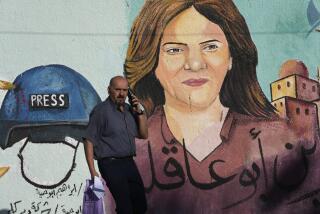CORRESPONDENTS, U.S. NAVY ‘IN SAME BOAT’ IN THE GULF
- Share via
DUBAI, United Arab Emirates — A voice suddenly broke through the static on the marine radio band with a call for help.
“British warship, the Iranian warship is boarding the Star Link,” the caller said with rising excitement. “You are doing nothing . . . nothing.”
Moments later, the heavily accented voice of an Iranian interjected, “Sea Link, this man of war will not be responsible for the consequences if you do not heed this call.”
It was an intriguing snippet of conversation, monitored in an apartment high above Dubai. Within 45 minutes, a chartered helicopter carrying CBS News correspondent Allen Pizzey and a camera crew was heading out over the Persian Gulf in search of the Sea Link, or the Iranian warship that seemed to be menacing it.
The helicopter failed to locate the ships, but Pizzey used the time aloft, which cost the network $2,000, to film American and British warships and to do a piece on camera about the congestion of navies in the Gulf.
“It’s very frustrating because you can hear the war, but you can’t see it,” said Pizzey, who has covered a number of Middle East conflicts for his network.
Martin Fletcher, a correspondent for NBC News, echoed Pizzey’s complaint.
“It’s all happening somewhere else,” he said. “It’s like an African war--you hear about it, you can read about it, but you’re not there.”
Although the gulf war has been on the front page and the television news for months, it gets no easier for journalists to cover.
For example, not long ago when American helicopters sank two armed Iranian boats, American newspapers and television networks were obliged to rely on reports from the Pentagon rather than on-the-scene reporting--even though most news organizations have correspondents in the area. There was simply no information available locally.
“It’s a very frustrating news story to cover because print journalists have virtually no access to what is going on out in the gulf,” said Ian Black, a Middle East correspondent for the Guardian of London.
“You’re dependent either on shipping sources or diplomats,” Black said. “Or you can go pleading to one of the television networks to see if they brought in any film of an incident. There’s no way my newspaper can afford to hire boats, planes and helicopters to patrol the Gulf.”
NBC News is thought to be spending $25,000 a day to cover the war. The NBC “air force” includes an airplane and two helicopters--one of which was fired upon by an Iranian vessel Friday. No injuries were reported, and an NBC spokesman said there was no damage to the helicopter.
CBS has the most sophisticated radio monitoring system, but ABC News scored a few scoops with a chartered boat tailing U.S. naval convoys.
Occasionally, the filming can be serendipitous. NBC cameraman Steve O’Neill was the first to sight a mine floating off the port of Khor Fakkan, and quickly warned nearby ships. But the gulf is enormous, and on many occasions a good bit of effort produces little usable film.
The reporters’ frustration derives in part from the U.S. government’s apparent decision to keep the press at a distance from U.S. forces in the gulf, including those accompanying Kuwaiti oil tankers under the U.S. flag. Even sailors on leave in Bahrain are under orders to avoid contact with the press.
The Pentagon has arranged several press pools, allowing television network and news agency reporters into some areas and aboard some ships with the understanding that they share the information and pictures they get. But newspapers and magazines have not been included since the first pool in July.
This has made it necessary for reporters in the region to rely on other sources, such as diplomatic contacts and shipping executives. A number of journalists call U.S. government officials in Washington and London to supplement the sketchy information available to them here.
Another limitation has been the reluctance of regional governments to allow reporters to cover the war from their capitals, lest one or both of the combatant countries, Iran and Iraq, take offense.
Television crews operating out of Dubai are not allowed to film in the United Arab Emirates. Correspondents frequently use vague datelines such as “in the Gulf” to avoid difficulty.
Iran and Iraq grant only occasional access to Western journalists, and as a result many dispatches are based on monitored radio broadcasts or accounts prepared by news agencies. One enterprising hotel staff in Dubai provides its journalist-guests with a digest of news agency reports delivered directly to their rooms.
More to Read
Sign up for Essential California
The most important California stories and recommendations in your inbox every morning.
You may occasionally receive promotional content from the Los Angeles Times.










